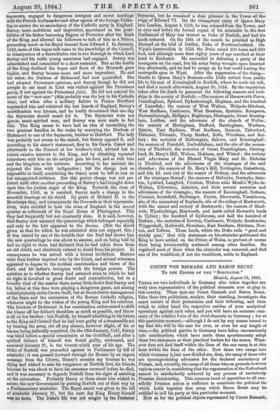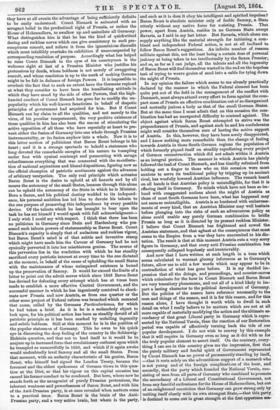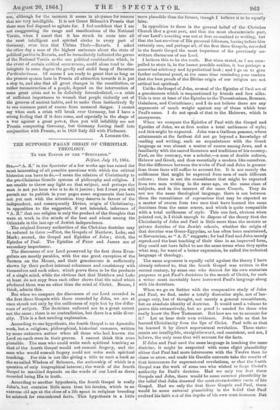COUNT VON BISMARK AND BARON BEUST. To THE EDITOR OF
THE " SPECTATOR."
Munich, August 15, 1864. THERE are two individuals in Germany who taken together are truly men representative of the political elements now at play in this country. These men are Count Bismark and Baron Beast. Take these two politicians, analyze their standing, investigate the exact nature of their pretensions and their following, and then weigh in either hand the respective residue of your analytical operations against each other, and you will have an accurate sum- mary of the relative force of the rival elements in Germany ; for at this particular moment,—although I do not by any means intend to say that this will be the case for ever, or even for any length of time,—the political parties in Germany have fallen unconsciously into combinations which have made them spontaneously adopt these two statesmen as their practical leaders for the nonce. What- ever does not find itself within the lines of the one camp is at this hour within the lines of the other. Now these two camps into which Germany is just now divided are, first, the camp of those who are uncompromising advocates for the declared ascendancy of Prussia, and, secondly, the camp of all those who on grounds however various concur in considering that the regeneration of the Fatherland cannot be satisfactorily achieved by any process of exclusively Prussian dictatorship. This common bond of opposition to all one- sidedly Prussian action is sufficient to constitute the political tie which holds together that array which Baron Beust may be entitled to call his party at this particular moment.
Now as for the political objects represented by Count Bismark,
sacrificed every patriotic interest at every time to the one dictated And now that I have written at such length in a tone which at the moment, in behalf of the cause of upholding the small States seems calculated to warrant gloomy inferences as to Germany's with the maintenance of whose unimpaired existence is bound future, allow me to add a few words which may appear to be in up the preservation of Saxony. It would far exceed the limits of a contradiction of what has gone before. It is my decided im- letter to point out the adroit moves which since 1848 Baron Beust pression that all the doings, and proceedings, and counter-moves has devised for defeating every attempt which has at times been which culminate for the hour in Count Bismark and Baron Beust made to establish a snore effective Central Government, and the are very transitory phenomena, and not all of a kind likely to ins- successful manner in which he has ingeniously contrived to check- part a lasting character to the political development of Germany. mate now Prussia and now Austria, as from one quarter or the But the politics of the season have reference necessarily to the other some project of Federal reform was broached which menaced men and things of the season, and it is for this reason, and for this that cause, called by the Germans Particularismus, for which reason alone, I have thought it worth while to dwell in such he had taken a brief. As it is he is a melancholy object to detail on what I really believe to be matters which are not at all look upon, for his political action has been as steadily devoid of all more capable of materially modifying the action and the ultimate as- patriotic principle as it has been marked by unfailing ingenuity cendancy of that great Liberal party in Germany which is repre- and subtle boldness. Still at this moment ho is in the position of sented by the National Verein, than the reaction of our Restoration the popular statesman of Germany. This he owes to his quick period was capable of effectively turning back the tide of our eye in discerning the deep feeling of the country in the Schleswig- popular development. I do not wish to convey by this example Holstein question, and that not to lend itself to it would be to that it will require in Germany even so long as it did with us for conjure up in increased force that revolutionary outburst upon which the truly popular element to assert itself. On the contrary, every- he trampled so unmercifully in 1850, and which if it again awoke thing I can see in this country gives me the impression, first that would undoubtedly level Saxony and all the small States. From the purely military and feudal spirit of Government represented that moment, with an audacity characteristic of his genius, Baron by Count Bismark has no power of permanently standing by itself, Beust, who himself had signed the London Treaty, became the —that it rests solely on the adventitious support of a monarch who foremost and the ablest spokesman of German views in this ques- is not young and of the foreign complications of the hour, and tion at the Diet, so that his vigour on this capital occasion has secondly, that the party which founded the National Verein, con- caused his former conduct to be condoned. But here, where now he sisting of men from all parts of Germany who combined to promote stands forth as the antagonist of purely Prussian pretensions, the the ascendancy of a Liberal and Constitutional Government, not inherent weakness and powerlessness of Baron Beust, and with him from any fanciful enthusiasm for the House of Hohenzollern, but out of the Anti-Prussian party, is at once revealed when matters come of an enlightened conviction that Germany can grow strong only by to a practical issue. Baron Beust is the brain of the Anti- uniting itself closely with its own strongest State,—that this party Prussian party, and a very active brain, but where is the party, is destined to come out in great strength at the first opportune sea-
they have at all events the advantage of being sufficiently definite and such as it is does it obey his intelligent and spirited impulses? to be easily understood. Count Bismark is animated with an Baron Beust is absolute minister only of feeble Saxony, a State arrogant belief in the predestined right of Prussia, or rather the utterly without any native force for resisting Prussia. That House of Hohenzollern, to swallow up and assimilate all Germany. power, apart from Austria, resides in no German State except What distinguishes him is that he has the kind of quickwitted Bavaria, as I said in my last letter. But Bavaria, which alone can daring and reckless nerve which can give consistency to such pre- supply anything like the material strength for initiating a com- sumptuous conceit, and relieve it from the ignominious discredit bined and independent Federal action, is not at all inclined to which must infallibly overtake its exbibitiou if unaccompanied by follow Baron Beust's suggestions. An infinite number of reasons corresponding resolution of purpose. Accordingly what has helped militate against this, not the least being a certain dose of personal to raise Count Bismark in the eyes of his countrymen is the jealousy at being taken in too intellectually by the Saxon Premier; welcome sight at last of a Prussian Minister who justifies his and so, as far as I can judge, all the talents and all the ingenuity pretensions by deeds, whose boldness is not merely of swaggering of Baron Beust will find themselves wasted in the end on the hopeless conceit, and whose resolution is up to the mark of making German task of trying to weave grains of sand into a cable for tying down might to be felt in defiance of foreign Powers. It is impossible to the might of Prussia.
overlook the fact that to such an extent have the Germans repined In my opinion the failure which seems to me already practically at what they consider to have been the humiliating attitude in declared by the manner in which the Federal element has been which they have stood by the side of other Powers, that the high- quite put out of the field in the management of the conflict with handed conduct of Count Bismark has gone far to modify the un- Denmark, must always attend every effort to form against the com- popularity which his well-known fanaticism in behalf of despotic pact mass of Prussia an effective combination out of so disorganized principles of government had acquired for him. But if Count and mutually jealous a body as that of the small German States.
Bismark can lay claim to all the qualities, and not merely to the But at the same time I must admit that on this occasion the com- vices, of his peculiar temperament, the very positive existence of bination has had an unexpected difficulty to contend against. The these qualities in him has also been the means of stimulating the object against which Baron Beust attempted to strive was the active opposition of all those who have especially at heart to pre- preponderance of Prussia, and against such he and his confederates vent either the fusion of Germany into one whole through Prussian might well consider themselves sure of having the active support instrumentality, or its fusion anyhow into a whole. Now it is to of Austria. In this, however, they have been sorely disappointed, this latter section of politicians that Baron Beust belongs in his and I know nothing more remarkable than the change of feeling heart ; and it is a strange spectacle to behold a statesman who towards Austria in those South-German regions the population of
son, although for the moment it seems in ab3yance for reasons that are very intelligible. It is not Count Big;mark's Prussia that these men feel disposed to agitate for. I feel confident that I am not exaggerating the range and ramifications of the National Verein, when I assert that it has struck its roots into all the most intelligent and spirited circles in every part of Germany, even into that Ultima Thule—Bavaria. I asked the other day a man of the highest eminence about the state of political parties in Bavaria, and he immediately indicated the germs of the National Verein as the one political combination which, in the event of certain critical occurrences, could alone tend to dis- integrate in some degree the goodly and stolid lump of Bavarian Particularismus. Of course I am ready to grant that as long as the present system lasts in Prussia all attraction towards it is put a stop to, and also that all great changes in the constitution, or rather reconstruction of a people, depend on the intervention of some great crisis not to be definitely forecalculated, —a crisis of sufficient importance to wrench that people violently out of the grooves of ancient habits, and to make them instinctively fly to one common point of rescue from menaced danger. I cannot say when such a crisis will break over Germany, but I have a strong feeling that if it does come, and espenially in the shape of a war against a great powtr, then you will infallibly see not Prussia conquering Germany, but Germany forcing itself into conjunction with Prussia, as in 1859 Italy did with Piedmont.
A LOOKER-0x.
































 Previous page
Previous page